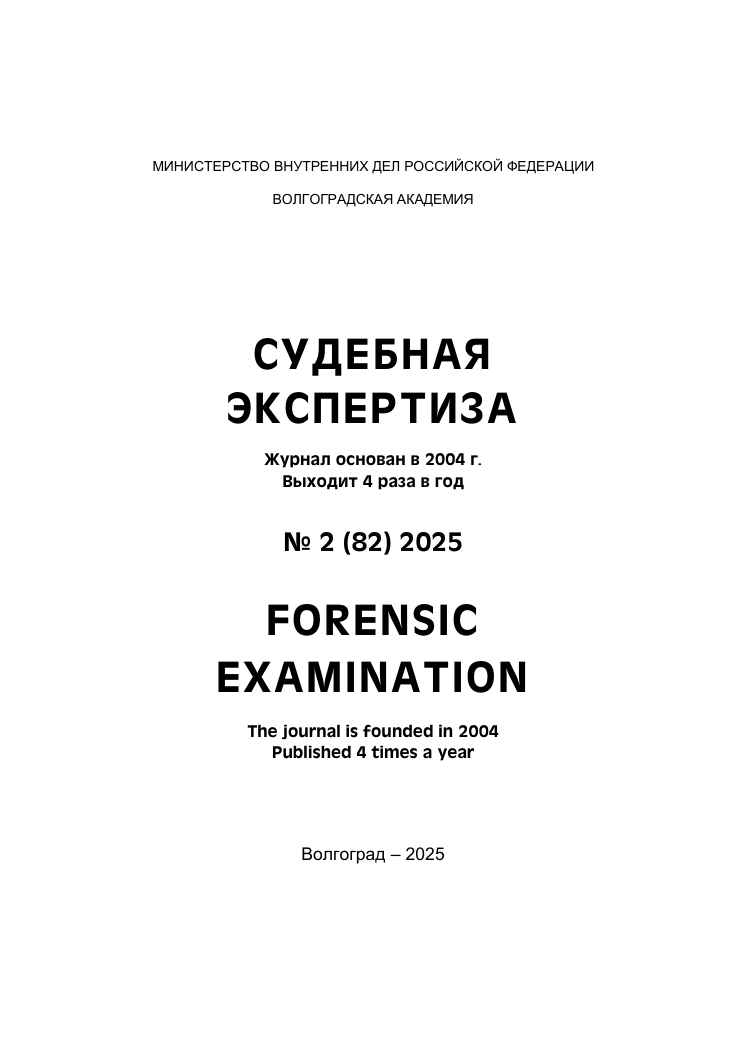employee from 01.01.2008 to 01.01.2025
Volgograd Academy of Ministry of Internal Affairs of Russia (kafedra issledovaniya dokumentov uchebno-nauchnogo kompleksa ekspertno-kriminalisticheskoy deyatel'nosti, zamestitel' nachal'nika kafedry)
employee from 01.01.2008 to 01.01.2025
Volgograd, Volgograd, Russian Federation
CSCSTI 10.85
The article is devoted to one of the promising areas of using artificial intelligence (AI) in forensic handwriting examination – creating AI-based software constructors designed for drafting expert conclusions and preparing illustrative materials. The article provides a detailed analysis of the advantages of automating this stage of forensic handwriting research. On the one hand, software constructors will be able to provide flexibility, allowing all features of the methodology to be taken into account based on the specifics of a particular expert situation. On the other hand, the presence of a certain algorithm standardizes the approach to conducting forensic handwriting examinations. The use of such programs will help avoid typical errors such as skipping some mandatory stages, incomplete investigation of diagnostic and identification signs, application of outdated methods, which in turn will contribute to improving the quality and accuracy of expert opinions. Using the example of handwriting expertise, an approximate functionality of a neural network program is demonstrated, including various blocks, starting from entering setup data about the initiator of the study, the expert, the circumstances of the case, describing the characteristics of handwritten execution of the disputed object, characteristics of diagnostic (including various specific symptom complexes) and identification signs of handwriting, a list of criteria for assessing the sufficiency in terms of quantity and quality of comparative samples, and ending with choosing the type of conclusion being formed, processing images in the illustration table, and outputting markings of all individual signs taken as the basis for the conclusion, importing data about their numbering into the research part of the expert's report. Implementation of these solutions will enable maintaining a high level of qualification of handwriting experts by constantly updating the databases available in the program with up-to-date libraries, information systems, and other software products and tools used in the activities of the Ministry of Internal Affairs of Russia departments. A thoroughly developed software constructor for drawing up expert conclusions can become a multifunctional and adaptive tool for enhancing the efficiency of forensic-science activity.
forensic handwriting examination, automation of expert opinion preparation, artificial intelligence, development prospects
1. National Strategy for the development of artificial intelligence for the period up to 2030. Approved by Decree of the President of the Russian Federation dated 10.10.2019 No. 490 "On the development of artificial intelligence in the Russian Federation" // Collection of Legislation of the Russian Federation. 2019. No. 41. Art. 5700.
2. Federal Law No. 123-FZ dated 04/24/2020 "On Conducting an Experiment to Establish Special Regulation in Order to Create the Necessary Conditions for the Development and Implementation of Artificial Intelligence Technologies in the Subject of the Russian Federation – the Federal City of Moscow and Amending Articles 6 and 10 of the Federal Law "On personal data"" // ConsultantPlus legal reference System / http://www.consultant.ru/document/cons_doc_ LAW_351127.
3. Spiridonov M. S. Artificial intelligence technologies in criminal procedural evidence // Journal of Digital Technologies and Law. 2023. Vol. 1. No. 2. pp. 481-497.
4. Fedorovich V. Yu., Khimicheva O. V., Andreev A.V. The introduction of computerization and artificial intelligence technologies as promising areas for the development of modern criminal justice // Bulletin of the Moscow University of the Ministry of Internal Affairs of Russia. 2021. No. 2. pp. 205-210.
5. Khmyz A. I. The use of artificial intelligence capabilities in forensic examination // Bulletin of Economic Security. 2022. No. 5. pp. 224-227.
6. Ismatova T. I., Tokareva E. V., Simonova S. V. A review of typical shortcomings in the conclusions of expert trainees in handwriting expertise. 2014. No. 1(37). pp. 101-112.
7. Khmyz A. I. Prevention of poor quality expert opinion. Bulletin of Economic Security. 2020. No. 2. pp. 233-236.
8. Buglaeva E. A. Prospects for the introduction of artificial intelligence technologies into the activities of law enforcement agencies in drafting procedural documents // Bulletin of SUSU. The Pravo series. 2022. Vol. 22. No. 1. pp. 7-12.





